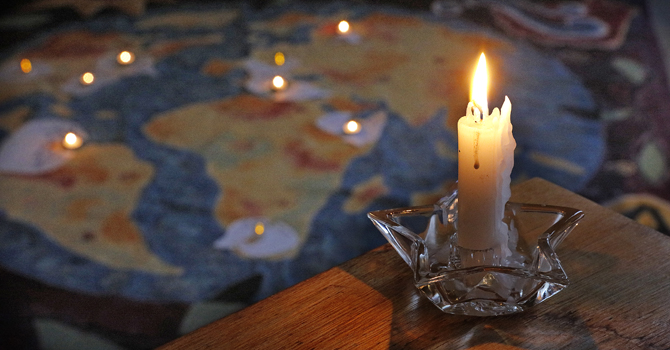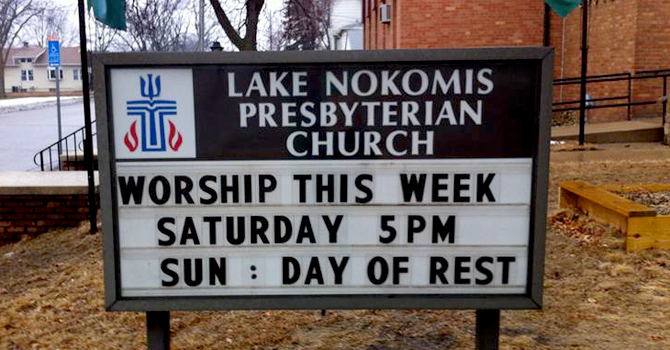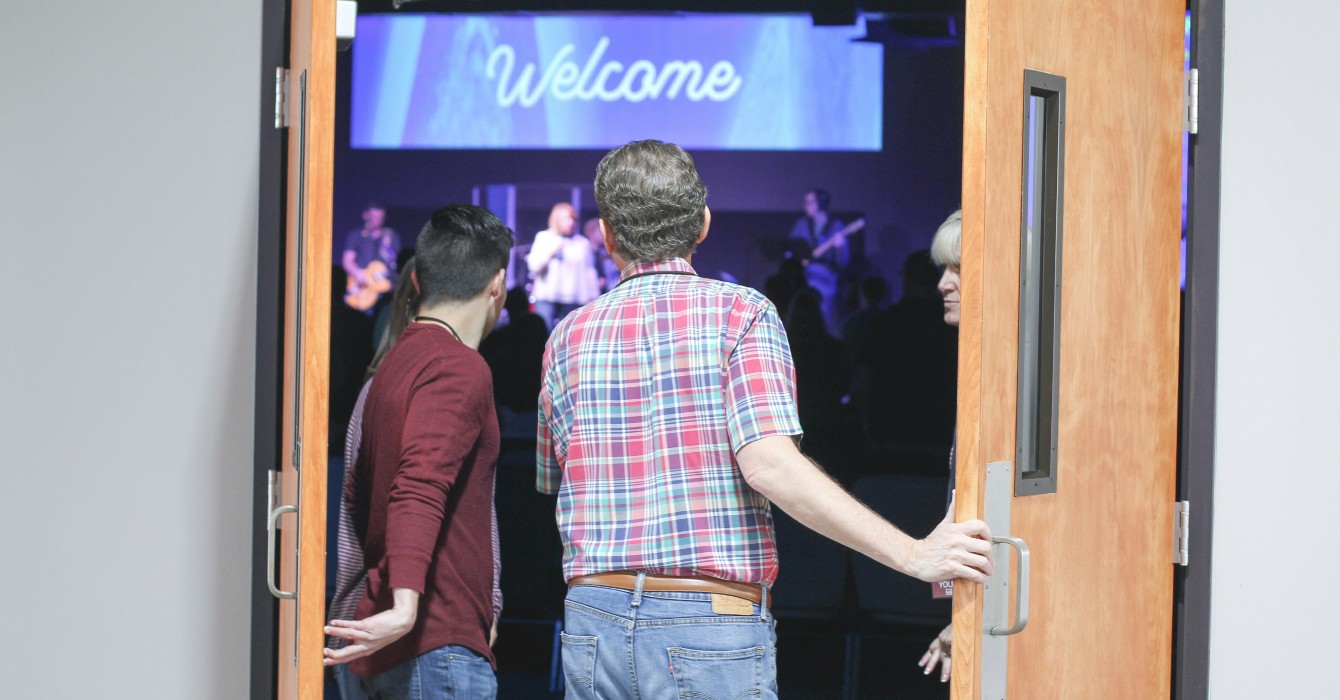When the Rev. Kara Root came to Lake Nokomis Presbyterian Church in 2008, the congregation wasn't exactly desperate.
"They were already past desperate," Root said. "They went through that stage before I arrived."
Nobody had joined the Minneapolis church in seven years. It had no children's program, because it had no children. All the kids had aged out. On a good Sunday, maybe 30 people attended services in a sanctuary that once routinely held 300 worshippers. And the church's once-comfortable endowment had just enough funds to last two more years -- if they really pinched pennies.

Lake Nokomis Presbyterian was dying, and everybody knew it -- even if they weren't quite ready to accept it. When Root realized the congregation wasn't willing to let go -- at least not yet -- she knew it was the right place and the right time to suggest something radical.
"The people who had stayed were hardy adventurers," she said. "They were ready to try new things. And I figured that if we went broke in 18 months instead of 24, what difference would it make?"
What would the circumstances have to be in order for your church or organization to make radical changes?
Strictly speaking, Root's idea wasn't new. In fact, it was thousands of years old. In a time when congregations are searching for new and different ways of being church, Root proposed that Lake Nokomis reclaim the ancient practice of Sabbath keeping and place it at the core of their identity as a congregation.
That might mean a day with no shopping trip to the mall. No pulling out a smartphone to check on work emails. No paying bills or balancing the checkbook.
And on some Sundays, under Root's proposal, it would mean not even going to church.
"People weren't coming every Sunday, anyway," Root said.
A changed worship schedule
After a period of discernment, the congregation agreed to change its worship schedule and place Sabbath keeping at the heart of its life together.

Now, six and a half years later, the pattern they established is a strong, sustaining rhythm. On the first and third Sundays of the month, Lake Nokomis holds traditional worship services. On the alternate weekends, members gather on Saturday evenings for contemplative services that draw upon the same Scripture and sermon as the previous Sunday's worship.
And on the second and fourth Sundays each month? They practice Sabbath, taking a rest from work, obligations, and even formal worship itself.
"I sleep in," said Sue Goodspeed, a member of the worship committee. "I don't get to do that often."
Lisa Larges settles down with a cup of coffee and the Sunday edition of The New York Times. "I read the whole thing," she said.

In months that have five Sundays, the congregation spends the extra Sunday participating in a community outreach event with a local nonprofit that offers mental health and educational services to children with emotional and behavioral issues.
The worship schedule is altered for holidays. Next Sunday may be the fourth Sunday in March -- normally a Sabbath day at the church -- but it will still be Easter at Lake Nokomis Presbyterian.
"Of course, we're going to have services on Easter," Root said.
How can your congregation keep Sunday worship from being “just another obligation?”
Nobody at the church is required to practice Sabbath, and though most congregants have readily joined in since the beginning, some are still less than enthusiastic. Dick Gross, a 50-year member, skips the Saturday services because it means driving after dark, and he misses the opportunity to worship on those weekends.
"To me, church is Sunday morning," he said.
But having watched the congregation shrink over the years, he also appreciates the logic behind the changes.
"It seems to work for the younger people," he said.

The decline reversed
Lake Nokomis Presbyterian is not on the cusp of becoming a megachurch, by any means, but the attendance trend has been reversed. Since the Sabbath practice was launched, the congregation has gained 18 new members and another dozen or so people who attend regularly. About 90 people are now members of the church; 40 to 70 attend Sunday worship services, and 12 to 25 the Saturday evening services.
Young families have joined the church, and the children's program is back. "It's great seeing kids running around the church again," Root said.

And the church's financial situation has improved. In fact, it donates 10 percent of its annual budget to neighborhood projects.
"One of the big questions for us was, how could we be a blessing for others," Root said. "We're financially stable. We're just as much in the hole as we were before, but at least we're not going any deeper."
One of the biggest challenges for Lake Nokomis members has been how to explain Sabbath keeping to people outside the church. After spending a Sunday in retreat from the many obligations of modern life, members are often bombarded with questions:
"Why didn't you return my phone call about the Monday meeting?"
"How could you not finish that PowerPoint presentation?"
"What do you mean your kid isn't coming to soccer practice?"
A countercultural practice
That's not surprising, said Dorothy C. Bass, the recently retired director of the Valparaiso Project on the Education and Formation of People in Faith and author of "Receiving the Day: Christian Practices for Opening the Gift of Time," a book about Sabbath practices.
Practicing Sabbath is very countercultural, Bass said.

"The ethos of society now is hectic," she said. "We're obsessed with productivity in a way that infuses most people's consciousness. … This has become so habitual that we don't even realize how broken we are."
In what ways does your congregation challenge cultural understandings of productivity and busyness? In what ways does it affirm them?
Root knows firsthand the knee-jerk guilt of breaking with societal norms. The first Sunday the church observed Sabbath, she and her family went for a walk through their neighborhood.
"We went past a church, and when I saw the parking lot full of cars, I felt like I was playing hooky," she said.
The cultural ramifications are one reason that Bass was excited to hear about Lake Nokomis Presbyterian and its journey together. Many individuals have taken up Sabbath keeping in recent years, but it is rare for an entire congregation to take such significant steps to encourage one another in the practice, she said.
"Doing it collectively, communally, with somebody else -- that's why it's really cool that a congregation is taking this on," she said. "I don't know of any individual who can say, 'I'm going to grant myself this freedom.' No, we're going to need to do that with and for each other."
The renewed interest in Sabbath practices among Christians started to surface about 20 years ago. Bass wrote her book in 2000; since then, the need for Sabbath has only grown stronger.

"I think the practice is more needed now than it was then," Bass said. "We've lost touch with natural time. Now we have Internet time, which governs the economy and is 365, 24/7. I don't think that's the way we were meant to be as human beings."
Sabbath at Lake Nokomis
At Lake Nokomis Presbyterian, the Sabbath Sundays are set aside "for rest and play, being instead of doing, connecting with God and others, and embracing the world with awareness and gratitude."
Exactly what that entails is left up to each individual or family, but the church doesn't recommend that participants drop off the radar completely, Root said. She suggests drawing a line between obligations and desires: do what you want to do, not what you feel that you have to do.
Members vary widely in how they make that distinction. Sabbath, like art, can be in the eye of the beholder. What one person considers a chore -- spending hours in the kitchen preparing an elaborate meal, for instance, or toiling on one's hands and knees tending a garden -- is someone else's notion of a perfect day.
"We have members who mow their lawn on Sundays," Root said. "They like doing it."
Youth sports are a typical source of conflict, even for Root and her family. With two children, the family came up with a rule to address the issue.
"If it's a game, it's fun, and we go," she said. "If it's a practice, it's an obligation, and we don't go."
Not everything is that cut-and-dried, of course. Member Andy Cochrane focuses on not worrying about work.
"I'm not always successful," he admitted. "But even if I don't make it all day, doing it part of the day helps."

Practicing Sabbath has had a profound effect on Root and her family, Root said.
"I'll never forget what that first day felt like," she said. "It felt like it was an eighth day. It felt like a gift. It gave me a palpable feeling of peaceful energy."
Taking an entire day off ran counter to everything she'd ever experienced.
"I come from a robust line of multitaskers," she said. "I was always trying to put 10 pounds in a 5-pound box. Now I'm focused on putting 5 pounds in a 5-pound box."
Goofing off, good for the soul
Most of what the church members do on the Sabbath could be described as good, old-fashioned goofing off. That's fine, Bass said. Goofing off can be good for the soul and the body. It's not just common sense; the Bible actually calls for rest.
"It still is one of the Ten Commandments," Bass said.
"It's OK just to rest," she said. "I believe that you can't get through a week without having some type of Sabbath. Your body will break."
In her book, Bass examined the theological, biblical and sociological influences on Sabbath and found three general approaches to the Christian Sabbath.
One is to celebrate creation. "It says in Genesis that God rested on the seventh day and looked at everything he did, and it was good," she said.
Another focuses on liberation. "In Deuteronomy, it says 'The Lord your God led you out of slavery.'"

The third involves being part of a community that commemorates the resurrection. "So get outdoors and celebrate creation. Do something that feels free and life-giving, and get together with people," Bass said. "I like to say, 'No church meetings [on the Sabbath], but church picnics are great.'"
What would an ideal Sabbath look like for you?
The Lake Nokomis congregation took to the Sabbath practice quickly. It was proposed as a one-year experiment, but "six months into it, we had changed so much that there was no going back," Root said. She knew how deeply the practice had taken hold in the church when she sent an email to a member and got a note back chastising her for sending it on a Sunday afternoon.
Saturday services
The inauguration of the alternate-weekend Saturday evening services didn't go nearly as smoothly -- to put it mildly. The long periods of silence in the contemplative-style services left many members uncomfortable and fidgety.
"The first service was a disaster," Root said. "It was almost painful. I came out of there saying, 'This is not going to fly.'"
But they kept refining it until it did fly, bringing together pieces from the Sunday morning service, meditative elements from the Taizé community and the self-directed features of contemplative spirituality.

The hour-long service begins with Root speaking to the assembled membership, offering an abridged version of the previous Sunday's sermon. Then the group breaks up. While music director Jeanne Rylander softly plucks a harp, some people meditate. Others visit various stations, where they can, for example, pray for troubled parts of the world, walk a labyrinth or simply rest. At one station, adults and children can color a banner that later will be hung in the church.
The Saturday evening program has enabled the congregation to reach out to worshippers who want something different from a traditional worship service but still like the direction that clergy can offer.
"We're not a one-size-fits-all church," Goodspeed said.
Even though the Saturday service repeats the Scripture and part of the sermon from the previous Sunday, some members like the different approaches so much that they attend both.
"I feel that I get something different out of it," Larges said. "We hear the same Scripture, but we hear it in different ways."
Ultimately, Root said, the goal of the Saturday services and the Sabbath practices is the same.
"Find ways you and God can commune," she told the congregation on the eve of a recent Sabbath Sunday observation.
"If you stop, God will come to you," she said. "You will experience something significant. And even if it happens on just one day, it will be worth it."
Questions to consider
Questions to consider
- What is the most radical and beneficial change you could envision your church or organization making? What would the circumstances have to be in order to make those changes?
- What is the core of your congregation’s identity?
- In what ways, if any, can Sunday worship become just one more obligation on a list of obligations? How can your congregation keep Sunday worship from being “just another obligation?”
- How does your congregation challenge cultural understandings of productivity and busyness? How does it affirm them? How can your congregation help members realize their brokenness and rethink those and other cultural assumptions?
- What activities and obligations would you give up if you were to practice Sabbath? What would an ideal Sabbath look like for you?






















